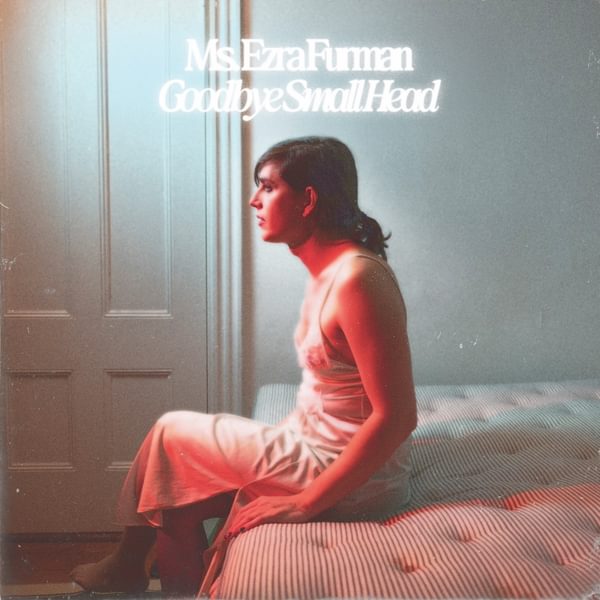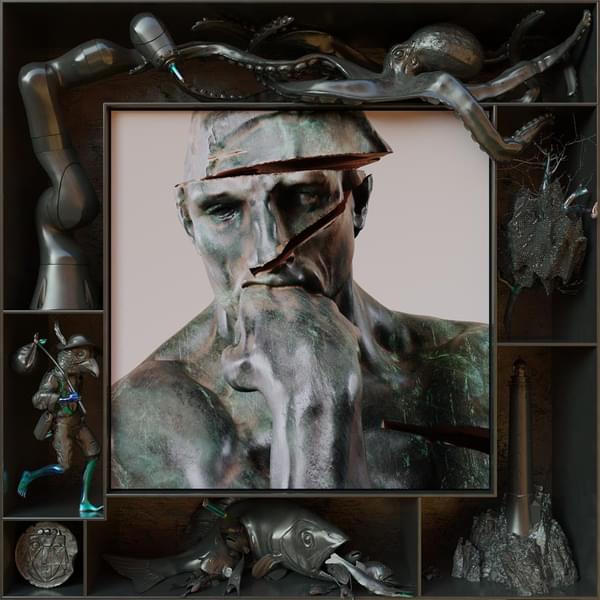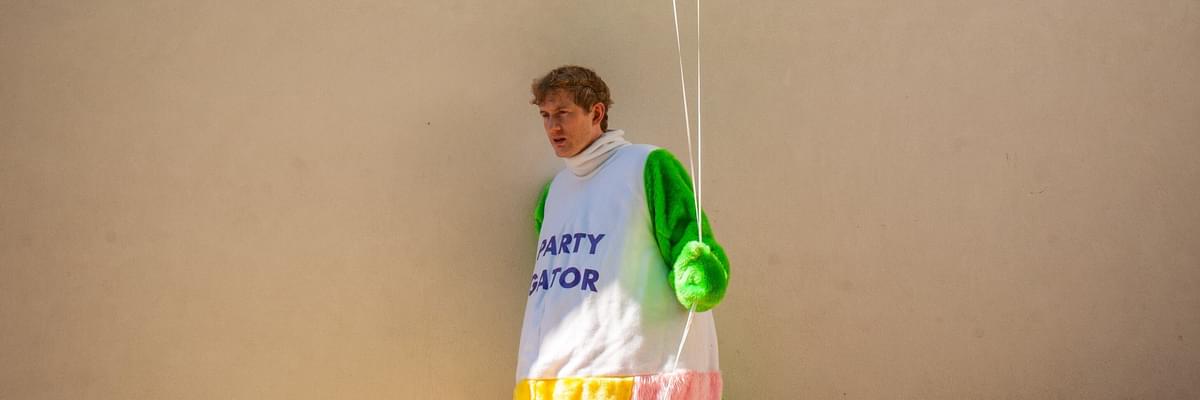
A beloved connoisseur of the cultural holy trinity of comedy, food and music, James Acaster unravels his nine most crucial tracks to Olivia Swash.
James Acaster thought his childhood dream of being a rockstar was a failed fantasy, but the comic has curated, produced and mixed an album by his collaborative project Temps, on which he played drums alongside his musical heroes.
After grafting on the circuit as a Kettering-based misfit comic 15 years ago and becoming a heavy-hitting household name, James Acaster is keeping things unpredictable and sticking with his passions. He’s a credible voice in the food world thanks to his genie waiter guise on his podcast Off Menu, and in his best-selling book Perfect Sound Whatever, he vulnerably discusses music as a solace and point of focus during his darkest mental health periods. The book and accompanying two podcast series proved him as a truly genre-diverse music obsessive as he forged connections with artists he admires - some of whom he would later recruit to contribute to his 40-strong global collective Temps.
The upcoming album devised by Acaster couldn’t be mistaken for an impulsive crack at a new hobby: it’s been a fixation from the age of seven, when he first started playing the drums and immediately fell for the scale and importance of long-plays. “All I wanted to do was release an album,” he remembers. “I don't know why I was obsessed with albums - not singles or playing live.”
Three decades later, Acaster is reflecting on how his younger self would feel about achieving his goal. “If you'd told me it would take this long to put out an album it might've seemed like forever, but there was a time when I thought, ‘It's not going to happen now. You're a comedian and that's it,’” he says. “So especially to be putting out something that I feel this passionate about, and totally creatively satisfied with - I didn’t think that would ever happen. There are times I feel like a little kid again.”
Acaster taught kids the drums and played in bands with friends - namely The Wow! Scenario and Capri-Sun Quartet, with song titles such as “Glad the Gold Socks Fit Like Feet Gloves” and “Instructions (to the Wizard’s Castle)”. Once his comedy soared, he drifted away from playing music, his kit went into storage and he became a self-described “former drummer”. But when Acaster’s parents warned him in 2020 that he had to retrieve his childhood kit, a challenge was sparked. “I thought if I’m gonna do that, I’d like to do something with it - some sort of project,” he says.
Admirably, Acaster decided he wanted to make a virtue of the fact that he was completely out of practice. He initially planned a mockumentary with Louis Theroux’s production company, which saw him dust off the kit and plunge himself into an intensive recording session. Soon after, the pandemic forced him to reframe his plan: he would make beats which could act as the spine for a bigger musical project. “I was aware I’d be really rusty,” he says. “I didn’t want to reacquaint myself and practise, then record something, as it’d probably sound even more rubbish than just playing it straight away without having practised. So recording immediately, the first time I'd played in 12 years, was important.”
Even now, having recorded his drumming on his own collective’s album, Acaster is still tentative about the “musician” label. “I still don't feel like I can say I’m a drummer, because it was this one time playing it again and embracing the rustiness and naivety of it,” he says. He drafted in his jazz drumming hero, Seb Rochford of Polar Bear and Sons of Kemet, for the next vital building blocks. “Every song is 50/50 me and Seb. My drumming is often loops of beats, then Seb played over the loops,” Acaster explains. “He was doing his best with how sloppy I was! Seb really likes using drums as a melodic instrument, so he would either embellish it or play a completely different beat to accompany it.”
“Getting to sit in the studio and watch Seb play along to all my drum beats was surreal, and that feeling continued throughout the project, with the more people that got involved,” he says of the singers, rappers, musicians and spoken word artists he gradually enlisted, including Shamir, Deerhoof’s John Dieterich, Quelle Chris, NNAMDÏ, Montaigne and Open Mike Eagle. “I listen to all their stuff obsessively and I think they're all incredible,” he gushes. “They’re all my heroes.”
Each had the flexibility to collaborate in an open way, synthesising their skills into an exhilarating album of multi-genre experimentation titled PARTY GATOR PURGATORY, after the project’s neon alligator mascot. “Some people wanted very clear guidelines, and some people didn’t at all,” Acaster recalls. “Learning how other people wanted to work, then doing it that way, was a really good way of working.” The process was new to him, as it was his first time producing and mixing something of this scale. “I didn't even know that what I was doing was production,” he says. “I was just enjoying collaborating with people and making this thing. I didn’t know what to credit myself as on the album, and someone said, ‘Well, you’re producing it!’”
When Acaster first started Temps, he figured he would put the final product out on Bandcamp and that would be it. Then, many of the contributing artists encouraged him to approach record labels, resulting in a release through Bella Union. “I'd had such a positive experience so far making something independently, having pure enjoyment from it - no downsides whatsoever,” he says. “I thought, ‘Here we go, this is now gonna be me knocking on doors of labels and them telling me it’s not good. I guess the fun’s over now.’ Then the first label I approached said yes! Wow.”
Across the timeline of the Temps project, the running theme seems to be trusting what feels right - not striving for perfection. But do his choices for his nine songs follow suit? He explains that his picks are “songs that genuinely, if I’m honest, are my absolute favourites. If I made the only mixtape I'd ever make, then that’s all you need to know about the music I like.” There’s one glaring upset about his list - it’s an unlikely bombshell from someone who made 117 podcast episodes trying to convince the world that 2016 is the greatest year for music. “Sometimes you gotta break away from that! I wanna spread the promo a little bit, plug a few other things,” he laughs. “I had to compartmentalise it all: there’s pre-2016, 2016, and post-2016. It’s very odd when you’ve done a project like that!”
“Little Person” by Jon Brion
I got into Jon Brion because of his work on films. I loved his songs on I Heart Huckabees and Magnolia. Around that era he was the go-to for a lot of people - that kind of quirky indie film soundtrack. Synecdoche, New York is a cool film, but I guess there are other films by the writer that I prefer. Eternal Sunshine is probably my favourite film - as any guy my age who is a little softboy would say.
Often he’ll do a song that sums up the theme of the film, and those are always my favourite Jon Brion songs. He has a real knack for not only picking up what the film is about, but what the universal subject is about, and what everyone can connect to in the film - the fact that we are all so microscopic in this huge world and we’re just trying to live our lives. That all the things that are important to us are also very tiny in the grand scheme of things. It sums that up really beautifully, both lyrically and musically. The way that the piano is played also reflects someone who sounds small but can also be very powerful and vital and important. Deanna Storey sings this so beautifully, and the whole arrangement is really delicate.
I've loved Jon Brion’s whole journey. I’ve gone back into his old band The Graze, it’s the kind of music I normally wouldn’t listen to much, but they do it really well. The stuff he’s done more recently in production - the Mac Miller albumCircles is a beautiful album, and his production is so perfect for it. He had to finish it without Mac Miller around, and he did a really good job of honouring him and making that as fitting a farewell album as he did. I’m such a big fan of him, and this, to me, is a high point.
“Its Not Easy” by Ofege
I bought a compilation album called Kenya Special, which was Kenyan bands from the ‘70s, and a lot of it was guitar-based music that had a clear African origin and influence but also a full rock band setup - a Kenyan take on rock music.
There was a lot of music I couldn’t find much of anywhere else, so I branched out and started looking for bands from anywhere around Africa who’d made ‘70s rock-influenced music, because I was hungry for that sound after that compilation. I found this Ofege album Try and Love. They were a Nigerian band who were teenagers when they made the album. They were still in school, which is nuts! On this song you can kind of hear that a little bit in the way that the guitar solos are very free. It’s someone really exploring their instrument.
There’s a really endearing quality to the song. Such an openness emotionally and musically. This song stirs me the most out of their stuff but the whole album is a very special album that’s gone on to be this cult classic. I guess you’ve captured them at a certain time in their life - adolescence - when they’re discovering the world and listening to all these different styles of music from countries all over, but also a lot of stuff from Nigeria, and mixing it with this guitar-based rock music. It ends up having a unique and special sound. A bunch of teenagers who self-describe as hippies - There’s something about that that holds an energy. It’s really magnetic, I think.
“I Don’t Care Anymore” by Doris Duke
This is from an album called I’m a Loser, which you’d think would be a Blink 182 album or something, but it’s by a gospel singer from Georgia in the late ‘60s. She was a backing singer, she sang on a Nina Simone live album, then adopted this performing name and made this album. It’s one of those albums that’s seen as a seminal soul album that’s been overlooked, but it’s influenced so many artists - I guess it’s a musicians’ album in a way. It’s pretty immaculate, and it’s the kind of song you’d hear and wonder why it’s not huge.
Every song has that heart-on-its sleeve emotion to it, and this song is my favourite because of the storytelling on it. It tells you everything you need to know about her. She’s giving you the story of her life, even though you’re not sure how much of it really is her life, or how much is from other people’s perspectives.
I love the guitar line on it - how it balances along for the whole song, also how she really drives the verses with the storytelling. Then the group vocals on the chorus singing the hook, with the drums doing this back-to-front snare then bass beat. Every choice that’s made on the song I think elevates it more each time. It makes me really gutted that she didn’t get bigger and that more people haven’t heard this album. After she released it, the record label collapsed, she released another album that didn’t do very well, and she focused on raising a family and everything kind of dwindled away. But if this is the only album you ever hear by her, you still get to know her full story until that point pretty well.
“Let X=X” by Laurie Anderson
I got into Laurie Anderson as a teenager and used to listen to her all the time. I was always making compilation tapes back then, and I always put her on to introduce my friends to her music, but I never knew which song to put on. Her album felt like one piece in and of itself, so taking one song out felt quite hard. But I’d always go with this song because of how much it lifts and changes in the middle, but I’d actually put “Let X=X” into the next song, “It Tango”. The way it progresses into that next song is perfect.
I didn’t know the album started out as a performance art piece until much later, as I’d never really read about the album. When I was a teenager and I got into it because it was in my dad’s CD collection, I was just listening to music and not really caring about what the backstory of any of it was. So for years this was just an album that I thought was pretty cool and pretty weird, and didn’t sound like anything else.
In terms of how my music taste has evolved and what I listen to these days, it doesn’t feel like that weird an album to me any more, and now it resonates with me even more. It really connects with me so instantly now, probably through nostalgia as well, having grown up with it.
“Black History Month” by Saul Williams
Saul Williams was my way back into listening to hip hop. When I was a little kid, I got into De La Soul and stuff like that, and would listen to rap music in primary school, then when I was 13 and got into metal and punk I was just listening to that for quite a long time until I was maybe 18 or 19. Artists like Saul Williams who straddled genres a little bit were my way back into listening to rap and hip hop. He definitely was rapping but coming from spoken word and poetry.
I was really excited when I saw he was doing an album with Trent Reznor. Even though I wasn’t a massive Nine Inch Nails fan, it was still really exciting to me that a rap artist and poet that I liked was about to do this album with an electronic rock/metal musician. Also that the debut single from the album was a cover of U2’s “Sunday Bloody Sunday” was really weird! And that the album title and cover was an homage to a David Bowie album (The Inevitable Rise and Liberation of Niggy Tardust), so it was all really intriguing.
The chorus is really hard-hitting - the attitude and energy of it. Even the title: “Black History Month” is so thought-provoking, it really makes you think, yeah, just a month in the school syllabus is mad. It’s crazy that that’s all certain cultures are given. Starting the album from there is so smart and powerful.
“Seba” by Leafcutter John
When I was a teenager and drumming, I listened to a lot of music where the drums stood out, so I listened to Seb Rochford’s Polar Bear a lot. Held on the Tips of Fingers was my favourite album, and on the credits was someone called Leafcutter John doing the electronics. It stood out cos everyone else had normal names. There was a V Shop in Kettering, which was a very brief CD shop that Virgin were trying out - and they had listening stations. I went and searched for Leafcutter John and I saw he had an album coming out called The Forest and the Sea. This was before ordering albums on the internet, it was the first time I remember ordering one on a screen - to be delivered to my house! I was so excited - I hadn’t even heard a Leafcutter John song ever.
I read about it and saw it was a concept album about a couple who go for a walk in a forest, get lost, and wake up on a cliff edge. They decide that rather than going home they’re going to dive into the sea, then they turn into animals and swim through the sea together. So I just couldn’t wait for this album to arrive, even though I had no idea what it would sound like.
It was this really mid-expanding indie-folk fused with experimental electronic elements and soundscapes and field recordings. It was the first concept album that I really fell in love with. This song starts off very repetitive with all the descending guitar notes, it feels like you’re maybe looking down at the ocean, then after a couple of minutes the song eventually drops and kicks in, and that is such a beautiful moment - it’s where the song really starts. I love how sad it is, but also optimistic - the conversation between the couple throughout as well is really beautiful.
“bless ur heart” by serpentwithfeet
This is an artist that I discovered on my 2016 project through the Blisters EP. I was really anticipating the debut album - totally one of my favourite albums of the last ten years. I went to see serpentwithfeet live at Hackney Earth and he closed with this song, which is my favourite on the album anyway. As the song came to an end he kept singing “bless your heart” and going round and round the hook, and he said, “You all have to sing with me, and if you don’t want to sing that’s fine, but you have to leave. I’m gonna keep singing til the room is empty. So you all sing until you don’t wanna sing any more, and you can go home and there’s no hard feelings.” The thing is, I hate singing out loud or in front of people. So I made a decision to immediately go home and it felt great. I didn’t feel like I was going, “Well fuck you I’m not gonna sing this,” or I didn’t feel like I was being kicked out. It felt good just to make that decision and go, “Yeah I’m gonna go.”
I went, and it felt really nice to have done that, and it was a weirdly special moment: not sharing the moment. Choosing not to still felt profound and special. He’s one of the best artists working today, his stuff is so emotionally intense and the wit and intelligence throughout all his stuff is very captivating.
“Skies of Millenium Night” by SikTh
This is from one of my favourite albums ever. I used to practise my drum rudiments along to this song because the time changes are quite hard. This song, especially the end, is really difficult to tell when one bar ends and the next begins, so it was really good to warm up to.
It’s not a genre of music I listen to a lot now, or even then - maybe I listened to math metal a bit more. SikTh were always so much better than all the others, because that kind of music can be very pompous and techy, and they have an element of not taking themselves too seriously. Tool are a bit like this as well, they’ve always had a jokey element to them.
There’s nothing else like Mikee Goodman’s vocals in any other style of music in any other metal band. Some of the best moments on this album are him putting on funny voices and saying these ridiculous things. That really marries up with this incredibly technical backdrop and instrumentation. It helps make sense of it all. Mikee Goodman, like Saul Williams, comes from a poetry background - very good with words, with painting pictures and telling stories, and creating multiple characters on songs.
When SikTh split up, there was a DJ on at a little pub called the Prince of Wales in Kettering. It was empty and he was playing metal songs. He said, “This band split up today, they were the best band ever,” and put this song on. I got up and danced on my own, cos I used to practise to it so I knew where all the changes were - it was a very cathartic experience for me as a 19-year-old, dancing along to this like a madman on my own in a pub. I hope that one day they do something that I love as much as this album, but if they don’t, this was enough.
“Angel” by Little Simz
I think she’s one of, if not the, best British artist today. This song represents where British music is at the minute, to me, especially British rap - she’s one of the best rappers in the world. I probably haven’t been this excited about a British rapper since maybe Skinnyman’s Council Estate of Mind.
Her releasing this album at the end of last year - it didn’t really get as much attention as I think it deserves. I love everything she’s done and I think all of it has been mind-blowing, but I think it’s my favourite Little Simz album.
As soon as it kicks in, I want to immerse myself in the whole project. I love the way she articulates exactly how she’s feeling at the moment when she starts talking about her personal and professional life. It’s so well done. And her wordplay - not just on this song, but throughout the project. She doesn’t make a big show of it, she’ll just say a bar and you can figure it out later.
I love the production from Inflo as well. I feel like it’s a real collab album even though he’s produced for her in the past. It feels like this is Little Simz rapping over Inflo beats. They’ve both really clearly defined their own musical personalities now, so you can feel both of their presence on every song.
Get the Best Fit take on the week in music direct to your inbox every Friday
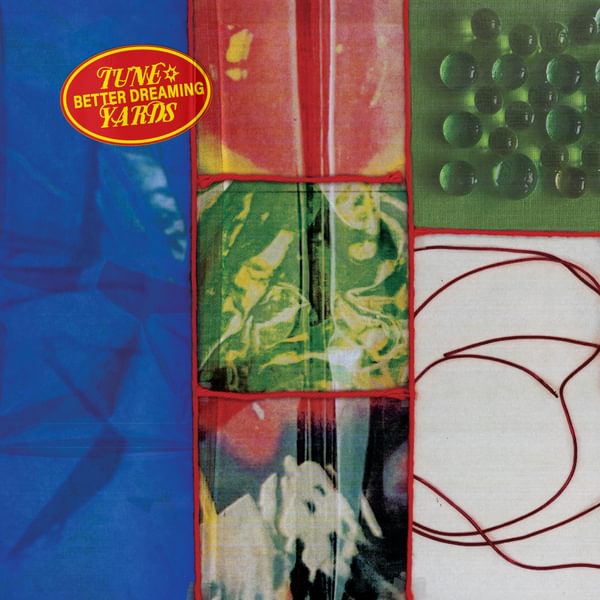
Tune-Yards
Better Dreaming
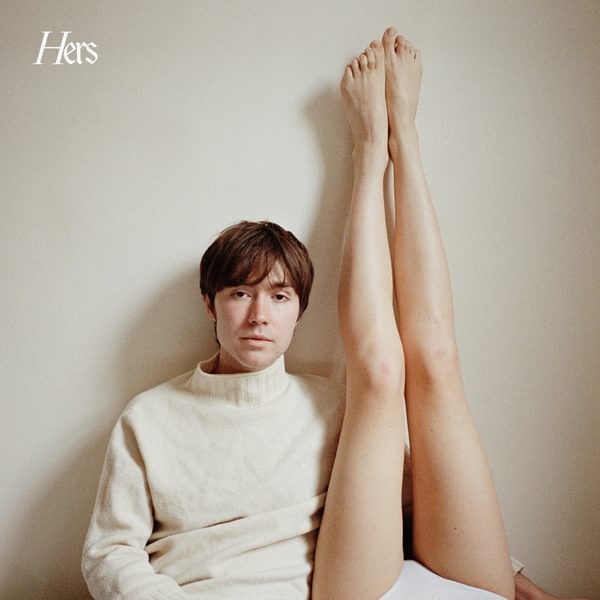
Matt Maltese
Hers
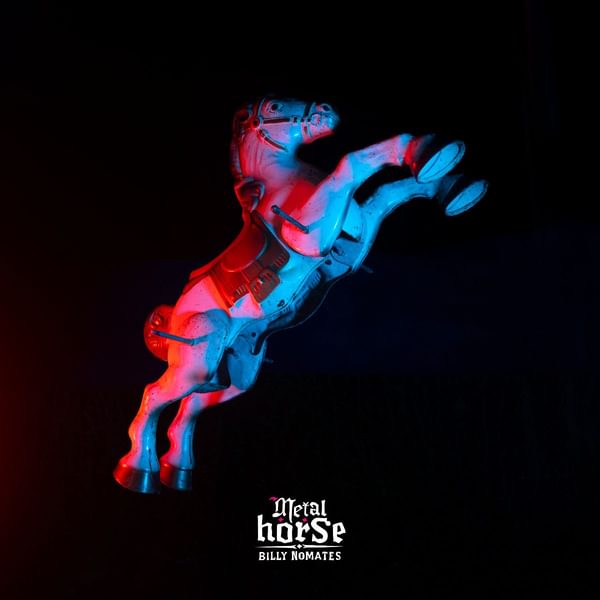
Billy Nomates
Metalhorse
